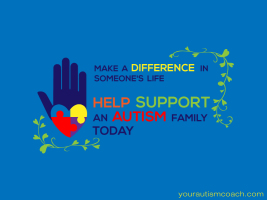HELP AN AUTISM AND SPECIAL NEEDS FAMILY TODAY!
EIGHT TIPS TO HELP AUTISM AND SPECIAL NEEDS FAMILIES DURING AUTISM AWARENESS MONTH
April marks Autism Awareness Month, and it is a perfect time to recognize the parents of children with autism and special needs.
Raising a child with a disability, while trying to balance work and family responsibilities is no easy task for even the most dedicated parents.Taking care of all facets of a special needs child daily living - including school activities, therapy sessions, medical appointments and personal needs - can be extremely demanding and time-consuming.
“Autism Awareness Month presents an opportunity for family, friends and the public to express their support for special needs parents,” said Deanna Picon, founder of Your Autism Coach, LLC and author of The Autism Parents' Guide to Reclaiming Your Life.
According to the Centers for Disease Control and Prevention (CDC), one in 36 U.S. children has been identified with an autism spectrum disorder. Behind these startling statistics are overwhelmed and unprepared parents, whose lives have been forever changed by an autism diagnosis.
"Special needs parents are unseen heroes who face autism and all the enormous challenges and responsibilities that go with it on a daily basis. They may be your sister, uncle, friend, neighbor or colleague," says Picon. "These mothers and fathers deserve respect and acknowledgment for many reasons, including the preserverance it takes to stay dedicated to this challenge."
While there are many ways to show support, here are eight tips that can make a huge difference in the lives of special needs parents during this month and beyond:
1. Give a well-deserved break. Parenting is a 24/7, 365-day job for these parents, so any time they can get a few hours for themselves is wonderful. Volunteer to watch their son or daughter at home or take him/her to a park or movie for a few hours. This will give parents the opportunity to participate in activities, events and hobbies they enjoy and rarely get a chance to do. A surprise gift card for a movie or local restaurant can be a delightful treat for parents
And if you're a family member or close friend, perhaps you can keep their child overnight or for a weekend. They'll have "peace of mind" knowing their child is safe and well-cared for. Best of all, there are no child care costs.
2. Offer to help. Pick up some food and beverages at the supermarket when you shop or drop off some mail at the post office. Assisting with simple errands will save parents much needed time and energy.
3. Bring a dish. A pizza pie, box of chicken or any take-out meal from a neighborhood restaurant can make everyone feel good and valued. Little cupcakes are fun treats for desserts.
4. Assist with household chores. Vacuum a room, sort the laundry, wash a few dishes or cut up some lettuce and tomatoes for a salad. Keep in mind, no gesture is too small and it will be appreciated.
5. Keep in touch and be supportive. Special needs parents often feel alone and isolated, so it's really beneficial to let them know you're there, if they need you. With Mother's and Father's Day approaching soon, this is a perfect time to send a greeting card letting them know they're great parents. Text, email or call to just say "Hello" and see how they're doing.
6. Listen without judgement. Allow special needs parents to vent, cry and blow off some steam. No one expects you to solve their problems or provide solutions. A friendly face or supportive voice on the other end of the telephone works perfectly.
The public can help special needs families in several ways:
7. Donate. Donations to local and national autism organizations that support autism and special needs can help make a big difference in the lives of those affected. They work tirelessly to help special needs individuals and families with various programs and resources. Purchase goods and services from companies that contribute to autism-related causes.
8. Educate Yourself. Take time to learn more about autism and special needs. Read some articles, watch a few TV news reports or go online to achieve a better understanding. This will help you better comprehend the challenges faced by parents and their children.







